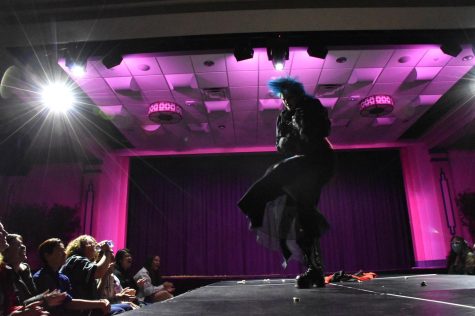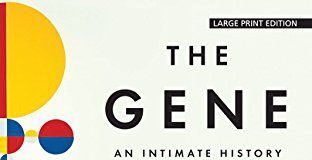Pop divas dressed in hot pink, “Hamilton” lovers, beard-wearers, devilish villainesses, vampires and Bollywood dancers — a melange of performers strutted a stage scattered with single-bill tips on Saturday night.
Pitt’s Rainbow Alliance held its annual student drag show in the WPU Assembly Room. Hosted by Corbin Makar, a junior communication and rhetoric major, and Morgan Chen, a junior German language and cultural studies major, the event showcased the talents of both experienced and first-time student drag performers. Complete with a runway-style stage, music, lighting and an audience ready with dollar bills, the event fostered a space to celebrate queer student art and talent.
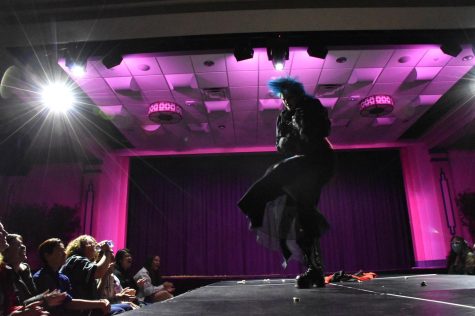
(Amaya Lobato | Staff Photographer )
Casey Withers, a sophomore political science and statistics major, who goes by the stage name Korra LaTierra, participated in the Rainbow Alliance drag show for the second time. She said the beauty of the LGBTQ+ art scene at Pitt comes from an appreciation for unapologetic self-expression.
“I’ve found people enjoy seeing you do what you love, regardless of whether that’s being openly queer or drag, or any other art form, people at Pitt gravitate towards other people who are doing their thing,” LaTierra said.
The audience at the show whooped and cheered for Korra LaTierra’s performances, “I Don’t Want It At All” by Kim Petras and “Girlfriend” by Avril Lavigne. She strutted and danced across the stage with a diva-esque personality wearing hot pink from head to toe.
Following LaTierra’s opening performance, student drag performer Slamma Tonne drew the audience in with a passionate lip-sync performance of “My Shot” from “Hamilton.”
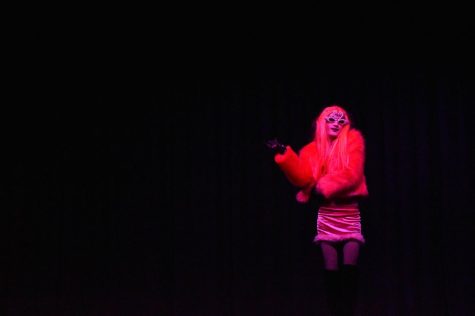
(Amaya Lobato | Staff Photographer )
Next, experienced performer and Rainbow Alliance board member, Brooke Beckwith, came on stage as his character, Richard S. Galore — a name he said he created as a play on the James Bond character, Pussy Galore — and tore up the room with a rowdy performance of “The Beast” by Tech N9ne. Galore ran through both the stage and the crowd. He slid on his knees, throwing his shirt into the audience and walking on all fours before a dramatic collapse as his finale.
Completing the first half of the show, student performer Count Frankly captivated the audience with a Dracula-esque outfit and vampiric theatrics, to the emo-classic, “You Know What They Do to Guys Like Us In Prison,” by the band My Chemical Romance.
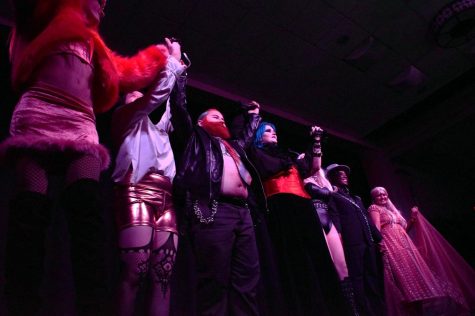
(Amaya Lobato | Staff Photographer )
Vida Skerk, an audience member at the show, excitedly caught Richard S. Galore’s shirt when he threw it offstage. Part of the 2022 MEET EU Emerging EU Filmmaker in Residence program, Skerk is visiting Pitt for a week and she said she admired the University’s acceptance and support for the LGBTQ+ community.
“What I enjoyed most was the openness towards queer people this place has and the visibility and freedom of expression of queer people, which is lacking in my home country, [Croatia],” Skerk said.
After an intermission, Shezilla, a board member of Rainbow Alliance who asked only to go by her drag name, reinvigorated the room in her feisty performance of “Stupid Boy” by AshNikko.
She stomped, strutted and growled on stage in a villainess costume consisting of a black leotard, horns, claws and a tail.
Breaking the trend of lip-synced, character-centered performances, Swan, a Pitt student and performer, received a standing ovation after singing Adam Lambert’s version of “Believe” by Cher. Swan said he considered Adam Lambert a role model growing up, due to his visibility as an openly queer artist, and Lambert inspired his performance on Saturday.
The night ended with performer Apsara whose more than 15 years of classical Indian dance training enthralled the room in their performance of the song Maar Dala from the Bollywood movie “Devdas.” With an impressive range of facial expressions, beautiful dancing and a mesmerizing cream and pink-colored Indian suit, the audience heard every beat jingle through Apsara’s bangles.
Apsara, who asked only to go by their drag name, is an international Pitt student from the south Indian state Kerala. They said they hope to inspire and affirm the identities of fellow queer people of color in spaces that they find often center white, American culture.
“I grew up with this creative culture that is extremely queer but never acknowledged as queer. I wanted to bring forth the queerness that’s kinda hidden away and seeing brown culture in spaces where it isn’t reserved for brown culture is important for fellow Desi people and people of color,” Apsara said. “Seeing fellow brown people being gay in these films, what we grew up with, is amazing.”
The exposure and visibility of a student LGBTQ+ group play an important role in building trust and belonging in the Pitt community for many students when they come to college, said Neeha Kolli, a sophomore chemistry and environmental science major.
Kolli said she not only enjoyed the performances at the show, but she also wanted to restart her engagement with the Rainbow Alliance community.
“[Pitt] is a predominantly white institution, but it’s also very diverse. There are a lot of diverse communities, and they are smaller, but they’re stronger here, and supported by really awesome people and organizations,” Kolli said.

